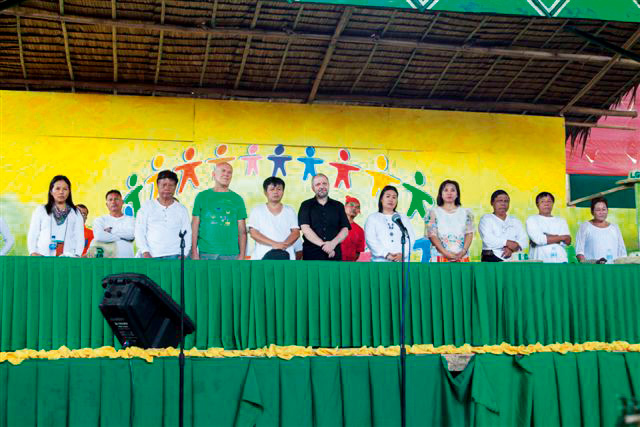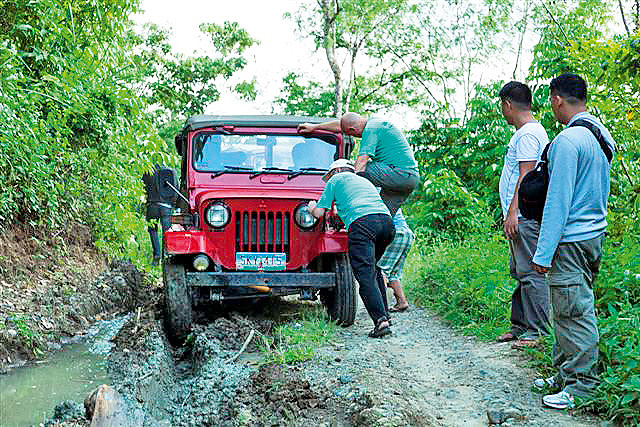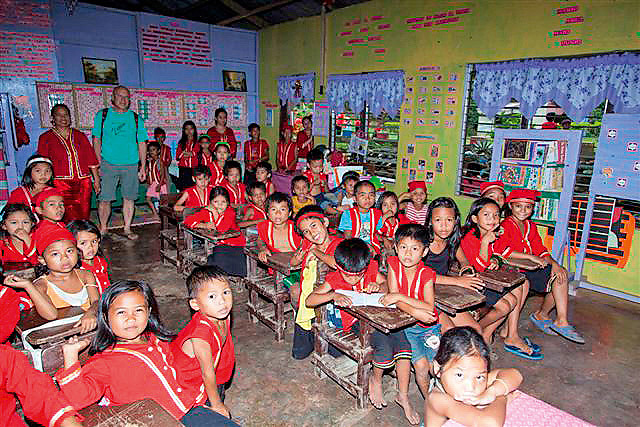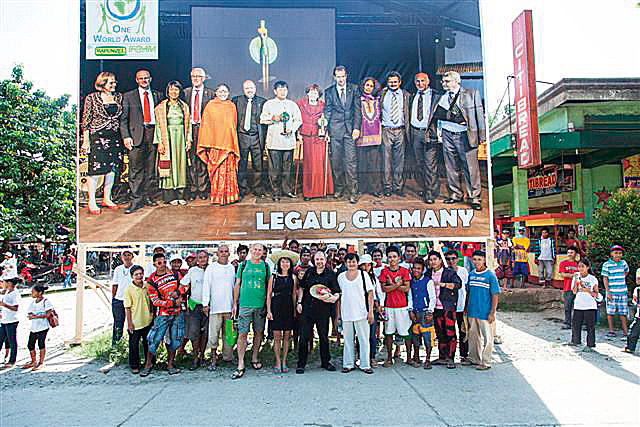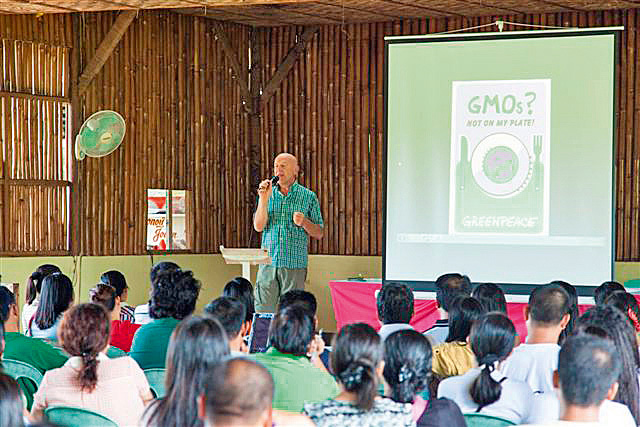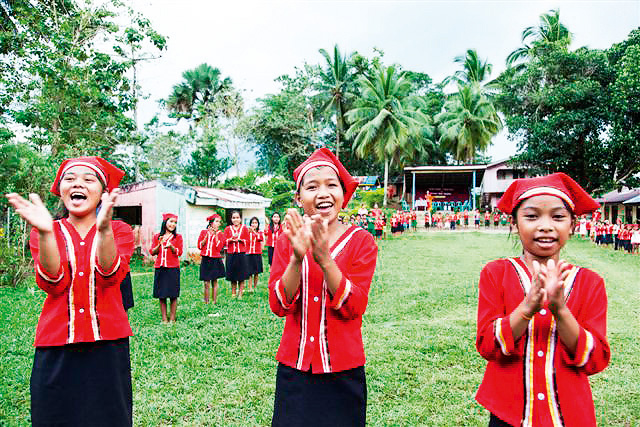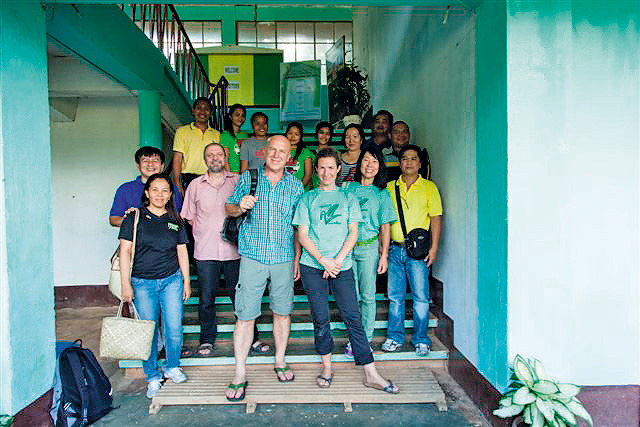Visiting Mayor Jun (Winner of the One World Award 2012) on the Philippines)
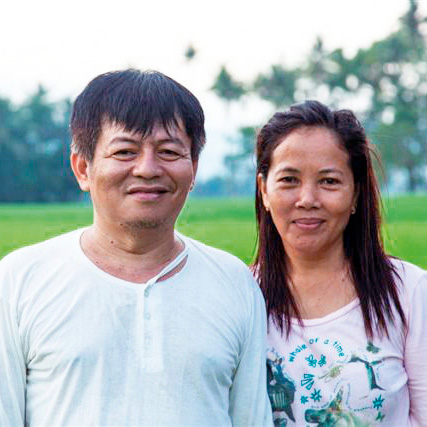
Small plots with an average area of 1.5 hectares
Mayor Jun, whose full name is Nacianceno Mejos Pacalioga, lives in the provincial town of Dumingag on Mindanao, the second largest island of the Philippines. In order to get there we travelled to Manila, the capital of the Philippines and from there to Ozamis City. From the airport in Ozamis City it took us another two hours by car to Dumingag.
In the provincial capital town of Dumingag live about 10,000 people. The entire municipality of Dumingag comprises another 40,000 people who live in almost 50 smaller communities, hamlets and innumerable homesteads. Mayor Jun is responsible for the entire municipality; currently he is in his second term as mayor. The task to transform his municipality into a “sustainable organic community” is his most important mission.
Most of the inhabitants of Dumingag are peasants who farm small plots with an average area of 1.5 hectares. The emphasis is on organic cultivation in order to improve the lives and the well-being of the people in the different communities. At the same time, organic cultivation helps the farmers to be less dependent on multinational corporations and their obscure business dealings.
In the provincial capital town of Dumingag live about 10,000 people. The entire municipality of Dumingag comprises another 40,000 people who live in almost 50 smaller communities, hamlets and innumerable homesteads. Mayor Jun is responsible for the entire municipality; currently he is in his second term as mayor. The task to transform his municipality into a “sustainable organic community” is his most important mission.
Most of the inhabitants of Dumingag are peasants who farm small plots with an average area of 1.5 hectares. The emphasis is on organic cultivation in order to improve the lives and the well-being of the people in the different communities. At the same time, organic cultivation helps the farmers to be less dependent on multinational corporations and their obscure business dealings.
The visitors were given seats of honor on the grandstand at the opening of the Organic and Cultural Festival.
Best Leadership Manner
Since alcoholism and excessive tobacco consumption are major problems on the Philippines, Mayor Jun organized very successful anti-drinking and anti-smoking campaigns. For these campaigns he was already recognized by the WHO (World Health Organization).
Using best leadership style, Mayor Jun succeeds to actively involve the people of his municipality in his projects, thus making the projects themselves very successful and meaningful. All those who participate in a particular project do this in a positive way and therefore actively support the project. This is especially important in a municipality like Dumingag where the individual communities are widely spread apart within a perimeter of 50 kilometers. Physical access to some of the communities is further impeded by weather conditions, especially during the monsoon season.
Cumbersome roads
Education is the key to success
The key ingredient for this success is excellence at all educational levels from primary school to the university as well as the vocational training. We witnessed very highly motivated teachers who were also very interested in our lectures on organic agriculture and the dangers of GMO.
In addition to the general university of agriculture, Domingag also has its own “Organic Farming School”. In this school the students receive comprehensive training in organic cultivation methods. The annual organic and cultural festival is yet another of Dumingag’s successful activities. During the festival the best performances in a number of categories are honored and the winners receive practical rewards for example small farming appliances.
School children
A large poster shows the proud winners of the OWA 2012
Very impressive is also the work in the context of natural resource management. Under the project heading of Kalpavali, the Sangas recruit tree planters and build capacities for the regeneration of wasteland. Until today, more than 3,000 hectares of wasteland have been ecologically restored; nature reserves and wildlife corridors have been set up in an equally big area. All these activities are administered by the Sruthi management structure with 110 full-time and 90 part-time workers. It is highly commendable how much can be achieved by a selfdetermined and just rural development initiative. Especially considering the fact, that many collectives in former socialist countries failed due to various reasons. As long as the business principles are guided by solidarity, ecology, fairness and justice a collective can be a very successful form of working together.
Joseph Wilhelm gives teachers a lecture on the risks and dangers of GMO
Very impressive is also the work in the context of natural resource management. Under the project heading of Kalpavali, the Sangas recruit tree planters and build capacities for the regeneration of wasteland. Until today, more than 3,000 hectares of wasteland have been ecologically restored; nature reserves and wildlife corridors have been set up in an equally big area. All these activities are administered by the Sruthi management structure with 110 full-time and 90 part-time workers. It is highly commendable how much can be achieved by a selfdetermined and just rural development initiative. Especially considering the fact, that many collectives in former socialist countries failed due to various reasons. As long as the business principles are guided by solidarity, ecology, fairness and justice a collective can be a very successful form of working together.
The students greeted us with a dance performance
Bernward Geier, Joseph Wilhelm, Justina Wilhelm and Dao Droste with female teachers



